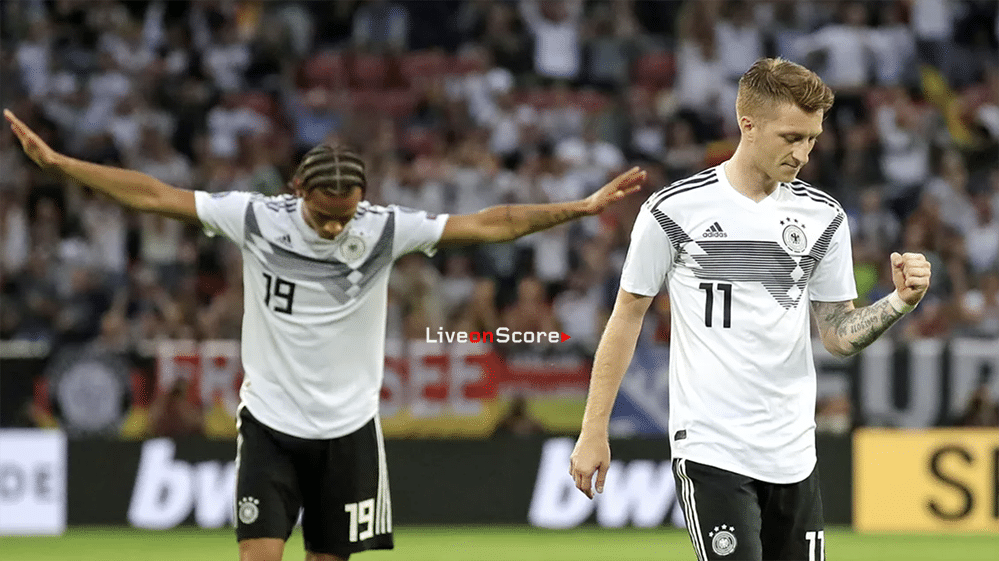Marco Reus: leading Germany’s revolution at the tender age of 30
Marco Reus is a special player. The Borussia Dortmund captain struck twice – the second a sumptuous free-kick – as Germany routed Estonia 8-0 in UEFA Euro 2020 qualifying on Tuesday.
Sports Livestream ⚽ JOIN NOW for FREE
Instant access to the BT Sport, Sky Sports and Eurosport
Nobody doubts Reus’s talent. The BVB man had a direct hand in a goal every 92 Bundesliga minutes he played last term. But Germany have been in a transitional phase since their early exit from the FIFA World Cup last summer.
Thomas Müller, Mats Hummels and Jerome Boateng have – for now at least – played their last games for Die Mannschaft. Joachim Löw’s move to a fluid 3-4-3 formation is reaping dividends, Germany undefeated in Group C having extended their record in qualifiers to 14 games without a loss.
And yet at the front of this evolution – indeed revolution – is a 30-year-old who first turned out for his country eight years ago. In fact, Reus was the only outfield player at the Opel Arena to have already seen his 20s come and go, the average age of the team 25 on Tuesday (and 24 when not including Reus and goalkeeper Manuel Neuer).
That free kick was probably my best goal for Germany,” grinned Reus after the match. [He] makes it look so easy, agreed Marcus Sorg, deputising in the Germany dugout for the recently injured Löw. “He made some great runs and made the most of the time and space he created for himself.
With a UEFA Champions League runners-up medal, as well as a DFB Cup and DFL Supercup won with Dortmund, Reus’s trophy cabinet glistens brighter than most players’, but he has still had far too much time in his career. Time on the sidelines. Time struggling with injury.
Osteitis pubis and a ruptured cruciate ligament alone have cost him nearly 400 days of playing time in recent seasons, and that’s not accounting for niggling hamstring, knee and thigh injuries that have also held up his progress.
It was an ankle injury that dealt him arguably his darkest hour, though. The last time Die Mannschaft played at Mainz’s Opel Arena – then known as the Coface Arena – was back in June 2014. Armenia were the opponents that day, and Germany ran out easy 6-1 winners.
Unusually, Reus wasn’t on the scoresheet; but there was an all-too common sight on the stroke of half-time when the Dortmund forward pulled up injured following an innocuous challenge from Artur Yedigaryan.
Reus had scored five goals and assisted three more in helping his nation qualify for the 2014 World Cup finals in Brazil. His injury prognosis back then was six to seven weeks – exactly the time Germany used to sweep past Portugal, Ghana, the United States, Algeria, France, Brazil – 7-1, unforgettably – and Argentina for the right to sew a fourth star above the crest on their jersey.
His teammates won hearts and minds as well as the trophy; but Reus could only watch on from home.
For me, a dream has been dashed, Reus said at the time. The first few days were extremely hard. Luckily, I had my family and friends around me. If, one day before leaving for Brazil, you get the bad news you can’t fly, it’s very painful. If you see how the World Cup ended, it hurts twice as much that I couldn’t be there.
Fast forward five years and Matthias Ginter and Julian Draxler were the only players not called Neuer to have featured both in Brazil and against Estonia on Tuesday. Mario Götze had held up a jersey with Reus’s name on it in the celebrations following his winning goal in the final in Rio de Janeiro; he watched Reus from home this week, without an international outing since November 2016.
Last season was meant to be one of transition for Dortmund too; but Reus played more minutes than all but three outfield colleagues as Die Schwarzgelben ran Bayern Munich to within two points of the title.
Where Reus pulls the strings for Dortmund from a central position behind Götze or super-sub Paco Alcacer, he has been used in the front three for Germany. For company have been Leroy Sane (23), Serge Gnabry (23) and Timo Werner (23) of late, and Reus hasn’t looked the slightest bit slower in speed or execution than the trio he has seven years on.
I’m delighted, said Reus in Mainz. We wanted to score the goals that were missing against Belarus and we certainly did that.
And Reus certainly did that. Nearly five years on from that dark day in Mainz, Reus’s international future has never looked brighter.









